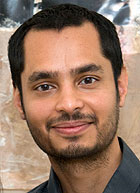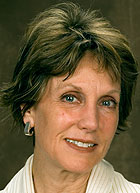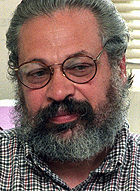The Center for the Humanities in Arts & Sciences has announced its spring 2010 Faculty Fellows.

The recipients are Asad Ahmed, Ph.D., assistant professor of Arabic with a joint appointment in the Department of Asian & Near Eastern Languages & Literatures and in the Jewish, Islamic and Near Eastern Studies Program; Angela Miller, Ph.D., professor of art history and archaeology; and Robert W. Sussman, Ph.D., professor of anthropology, all in Arts & Sciences.
Fellows spend a semester in residence with the center, researching a new book project while performing various duties, including the delivery of one formal, public lecture about their work.
Ahmed’s book is tentatively titled “Empire and Periphery: A Social Network Analysis of the Hijazi Elite in the Early Islamic Period.” It aims to reconstruct the sociopolitical history of the elite families of the Hijaz, a province in the Arabian Peninsula, for the entirety of the first and part of the second Islamic dynasty (661-833).
The work consists of two parts. The first explores the nature of the sources, supplies a basic demographical and geographical mapping of the area and gathers the available fragmentary information on the economic and administrative history of the region.
The second part draws on quantitative and social network analysis to explore the social structure and sociopolitical history of the most prominent elite families. Taken together, these two divisions not only constitute a detailed provincial history but also bring to light the ways in which the central authorities managed a vast empire in the early history of Islam.

Miller’s project, “Homeless in America: Alternative Modernisms, 1900-1940,” centers on the sense of homelessness or metaphysical dispossession that paradoxically drove the native search for roots in American modernism of the early 20th century. The work situates “homegrown” or native modernism in the United States in relation to a longer intellectual history that reaches from 19th-century literature to ideas about nation, place, space and identity in the arts of the early 20th century.
Miller will map the expressive, iconographic and ideological dimensions of native modernism in relation to the very different impulse behind “cosmopolitan” or nomadic modernism. Native and cosmopolitan modernisms turn on strikingly different philosophical, aesthetic and cultural positions, yet both respond to a condition of spiritual displacement that would come to be a defining feature of American culture in the eyes of American and European intellectuals and, more broadly, a central element of modernity itself.
Sussman’s project entails the research, writing and publication of “Essays on Race and Culture.” The book will contain two separate but interrelated essays: “The History of Race and Racism in Western Science and Society” and “The Importance of the Concept of Culture in Anthropology, Science and Society.”
In these essays, Sussman will trace the history of two views of race — polygenic vs. monogenic — from the Spanish Inquisition of the 15th century to Charles Darwin’s time to the early 20th century.

He will show how these two views were instrumental in the development of social Darwinism, eugenics and Nazism on the one hand while contributing to the concept of culture on the other. He then will discuss how modern biology provides evidence that human races do not exist biologically and, therefore, that modern concepts of race have been historically and culturally determined.
Now in its fourth year, the faculty fellowship program is designed to provide both physical and intellectual environments for innovative, interdisciplinary scholarship and teaching.
The fellowships are open to all tenured and tenure-track faculty in Arts & Sciences. Winners are selected by a panel of University faculty and outside reviewers.
Applications for the 2010-11 academic year will be accepted from July 1 to Oct. 1, with announcement of the winners in December.
For more information, go to cenhum.artsci.wustl.edu or contact Jian Leng, associate director of the center, at 935-4008 or cenhum@artsci.wustl.edu.